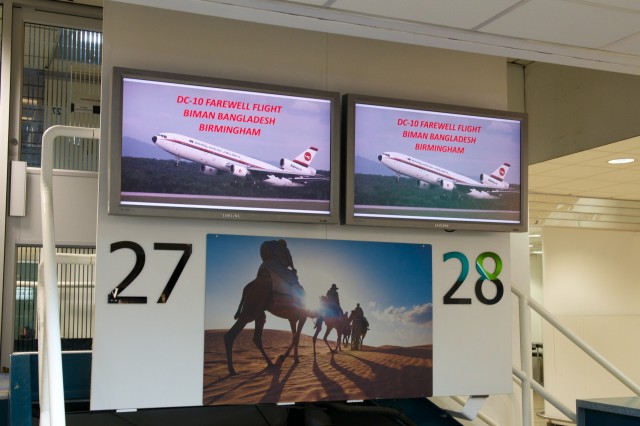
Checking in for a very special flight – Photo: Bernie Leighton | AirlineReporter
This is the final part of a three-part series documenting the DC-1o’s final passenger flights. Click here for Part 1 (flying from Dhaka to Kuwait City) or click here for Part 2 (flying from Kuwait to Birmingham).
I felt lucky, but also as if I had spent the better part of the last few days being beaten by 2x4s. I was able to fly on the last schedule passenger flight for the DC-10, the creator of my dismay (that much time with air that dry had some long-lasting affect). If that wasn’t enough I was going to fly on the very last, and I mean the absolute final DC-10-30 passenger flight . My flight wouldn’t be long, but it would be adventurous. I had already put in quite a bit of time with this DC-10 and was ready for another level of AvGeek adventure.
Check in was brisk. I was actually in the terminal a little early anyway to meet my friends and try to sort out a ticketing matter with Delta (it didn’t work; I had to wake up early the next day to fix it) so I thought after one failure, I may as well go for a win.
My boarding pass was issued promptly, seat 33A. There were no bags to check, obviously – I was just going up to Scotland, than back down to BHX.
I made my way up to the makeshift Biman store to purchase some safety cards. Whilst there, it became clear that this last flight was going out with quite a fanfare.
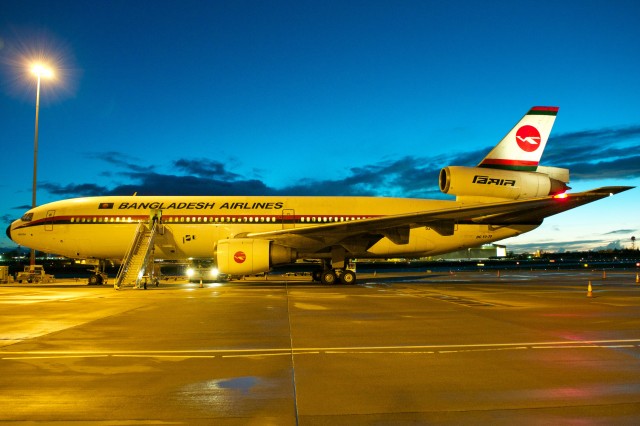
S2-ACR in the darkness of Birmingham after arriving late from Kuwait City – Photo: Bernie Leighton | AirlineReporter
This is the second part of a three-part series documenting the DC-1o’s final passenger flights. Click here for Part 1 (flying from Dhaka to Kuwait City).
Flying on the first leg to Kuwait on our way to Birmingham on the last DC-10 passengers flight was surreal, yet exciting. Landing in Kuwait seemed like a good almost-final stop for the DC-10, since I love old airliners landing in interesting places.
I have to say that ground handling in Kuwait was less than ideal. First, we had to hold on a taxiway just to the south of the main terminal for approximately twenty minutes. Then, we had to taxi to a hardstand adjacent some private jets. Kuwait Airport is the first I’ve have seen that actually offers fixed sunshades to keep your VIP aircraft from melting under the relentless Arabian Gulf sun.
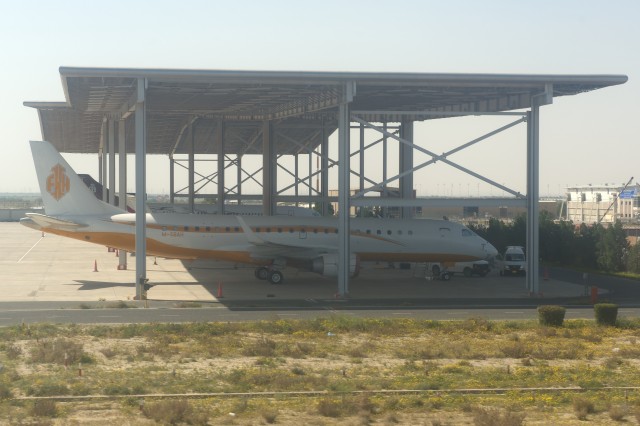
An example of the executive jet verandas at Kuwait International Airport – Photo: Bernie Leighton |AirlineReporter
Finally, the engines were shut down and a ground services truck appeared. Since the flight was double-catered out of Bangladesh, it was merely the aircraft groomers.
These were groomers who had no idea how many lavs there were on a DC-10-30, or where the galleys all were. It was at this time I also learned that, while there was no in-seat power, there were a couple of power points located around the aircraft. I almost tripped over someone’s battery charger in the number four lav!
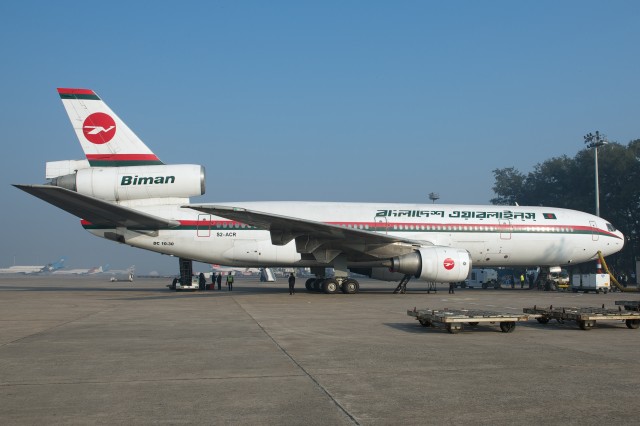
S2-ACR on the ramp at Hazrat Shahjalal International Airport – Photo: Bernie Leighton | AirlineReporter
So, you want to fly on a DC-10 in 2014? Bad news. Very bad news. I hate to tell you, but that ship has sailed. Until a few days ago, that was not the case.
Arriving into Dhaka at 4:51 am, the first thing I noticed was the haze. I really have no idea where it comes from – it seems to burn off by the afternoon. The next thing I noticed about Bangladesh was how easy it was to get a visa on arrival. If you were wondering, Dhaka is only certified for CAT-1 ILS approaches. This has been known to wreck timetables and force diversions to far off points.
The first thing I noticed was that the airport has a great degree of 1970’s Marxist-chic to it. I admit, the airport actually opened for passenger use in the 1980’s- but there were many stop-and-start construction efforts that make it, in some ways, the most amazing the airport was ever (semi) completed.
I had exactly twenty four hours in Dhaka and almost no idea what to expect. Dhaka’s a very fluid city; the buildings may look the same, but the traffic is a variable no one should mess with! Thankfully, the hotel shuttle never seemed to have much of a problem finding either a semi-paved or unpaved road to beat the chaos. The other thing not included in travel brochures about Dhaka is that no matter what hour of the day, someone is riding their car horn.
But I wasn’t in Dhaka for the traffic or interesting architecture. I was there to take the last passenger DC-10 flight ever.
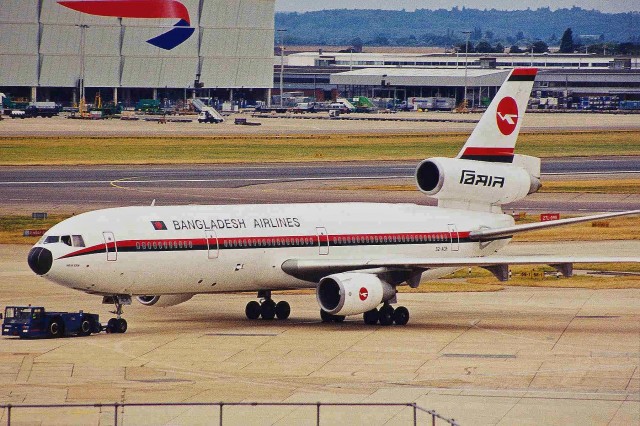
S2-ACR, the last DC-10 in any sort of passenger service – Photo: Ken Fielding
Starting tomorrow, the last Douglas DC-10 will start its farewell tour as the last passenger DC-10. Biman Bangladesh Airlines will fly to Birmingham, UK, by way of Kuwait and then offer scenic tours before it is finally ferried to a final “resting” location in the US. Our own Bernie Leighton will be covering these events from Bangladesh and beyond, but before we tell the last chapter of this majestic aircraft’s life, we wanted to start at the beginning with this historical look at the DC-10.
The birth of the wide-body airliner as we know it today can be traced back to one event in the early 1960’s: The United States Air Force’s request for proposals for the CX-HLS, the program that would ultimately become the C-5 Galaxy. Lockheed won the CX-HLS competition, and as legend would have it, Boeing would strike gold when they converted their design into what we know today as the 747. However, that is not quite 100% true, and Boeing was not the only company to transfer design philosophies from the CX-HLS to the commercial market.




